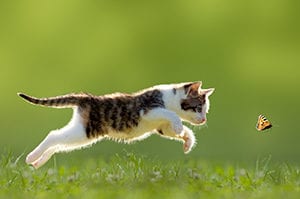 Tips to Keep Your Pet Healthy this Spring
Tips to Keep Your Pet Healthy this Spring
Freezing temperatures are quickly becoming a thing of the past, but there are plenty of new, potential hazards to be wary of for the spring season! Below, we’ve provided several important spring safety tips to help you protect your pet from sticky situations.
Parasite Prevention
As the ground thaws, all kinds of bugs emerge from their dormant state to irritate us. This includes various parasites, such as fleas, mosquitoes and ticks, which can cause trouble for your pet. These parasites can cause allergic reactions and harmful diseases. With adequate protection, your pet can stay healthy.
We recommend keeping your pet on flea, tick and heartworm preventatives throughout the year for maximum safety. Talk to your veterinarian about which parasite control products will work best for your pet.
Cleaning Supplies
Your household spring cleaning products may contain toxic ingredients that can make your pet very sick. Chlorine, ammonia and other chemicals are dangerous. Make sure you’re using your cleaning supplies as directed, and store all containers in places your pet can’t reach.
Additionally, there are plenty of pet-friendly cleaning products on the market that you can try.
Toxic Plants
You are probably familiar with poisonous plants such as poison ivy, poison oak and poison sumac. However, there are many varieties of flowers that, if ingested, can be detrimental to your pet’s health. This includes day lilies and peace lilies, amaryllis, daffodils, azaleas, hydrangeas, crocuses, oleander, tulips and hyacinths.
Essential Oils
Most essential oils are harmless for pets, especially if they are diluted and used in oil diffusers. However, placing certain oils on your pet’s skin/coat or allowing them to ingest it can be very dangerous. High-risk oils include tea tree, citrus, cinnamon, pine, ylang ylang, and pennyroyal. Lavender, chamomile, spearmint and thyme are considered safe.


 Tips to Keep Your Pet Healthy this Spring
Tips to Keep Your Pet Healthy this Spring
